Human Development & Family Science News
Exploring Careers
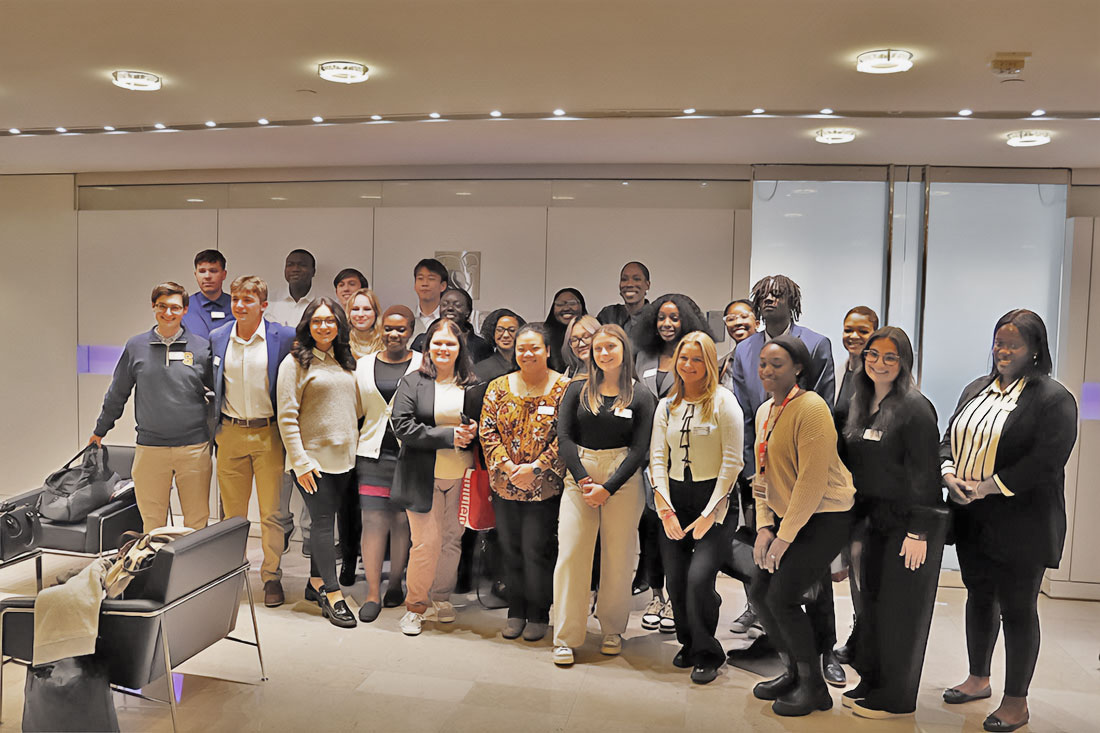
The Falk College of Sport and Human Dynamics at Syracuse University is a unique college with a diversity of programs from Exercise Science to Social Work to Sport Analytics.
The common denominator is Falk’s focus on experiential learning, and this past fall 27 students representing on-campus and online programs from all departments participated in one of the college’s most immersive experiences: the “Falk in D.C. Career Exploration Trip” hosted by the Office of Career Services.
It was the third Falk in D.C. trip, but the first that included separate tracks for health/human services and sport-related careers, with all attending Falk students joining together for select site visits and panels that represented both health and sport professionals. The students engaged with alumni and employer representatives from 28 Washington, D.C., and Baltimore area organizations through site visits and panels, and even more at the alumni networking reception.
“The combined nature of the trip allowed many students to expand their professional interests and discover the overlap between health and sport professions,” says David Sly, associate director of career services. “Over the course of the trip, all attending students demonstrated new or improved ability and confidence in career skills including networking, industry knowledge, communication, and awareness of professional values.”
Health students met with representatives from the FDA, USDA, CDC, Bread for the City, Urban Institute, and MedStar, among many others. Sport students met with representatives from several organizations, including Under Armour, Big League Advantage, Washington Commanders, Monumental Sports and Entertainment, DC United, and Leveling the Playing Field.
All students participated in visits with the NFL Players’ Association, Washington Nationals, Building Bridges Across the River, Living Classrooms Foundation, and PeacePlayers, International.
“The Falk in D.C. Career Immersion Trip gave me the opportunity to learn about the vast array of options that will be there for me post-graduation in the public health field,” says public health major Brinda Parikh ’26. “Being able to hear firsthand from industry professionals about their experiences throughout their careers was very eye-opening, and this trip helped me grow my network of Syracuse University alums that could help me in my own career in the future.”
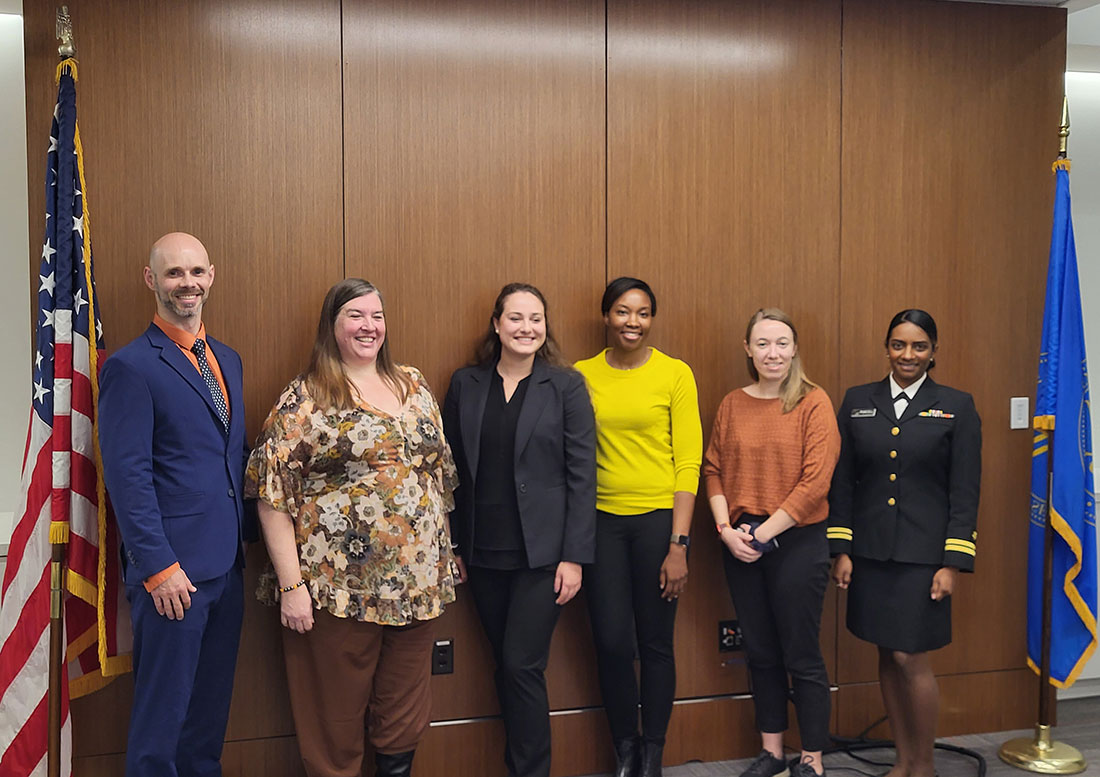
When the students returned from D.C., Career Services asked for their reflections of the trip, how it fit into their decision to attend Syracuse University, and their career goals. Here, we’re sharing responses from five students from across the college: master of social work student Nicole Corrente, public health major Tommy DaSilva ’26, health and exercise science major Alexia Harris ’26, sport management major Brianna Nechifor ’26, and sport analytics major Liam Roberts ’27.
Why did you choose Syracuse University and Falk College?
Alexia Harris: I chose health and exercise science because I have always loved studying the way the body works and moves. I chose Syracuse University because its program is amazing and has already set me up for success in my first semester here.
Tommy DaSilva: I chose both of my majors (public health and policy studies) because I wanted to be able to improve the lives of others through government action or nonprofit community work.
Brianna Nechifor: I chose to become a sport management major because I was encouraged to enter the industry by my tennis coaches and friends who saw my burning passion for sports. I chose Syracuse University because of the community and opportunities that are available to me, including the Sales and Marketing Club, Sport Management Club, and WISE (Women in Sports and Events).
Nicole Corrente: I’m a graduate student of social work who’s originally from Syracuse, so choosing Syracuse University was a natural fit.
Liam Roberts: Outside of school my biggest passion has always been sports and in school I always enjoyed math and working with numbers. As a result, the sports analytics major was perfectly catered to what I am interested in and what I want to do in life. The opportunities this major provides, including ones like this D.C. trip, were not available anywhere else and it’s ultimately why I chose to attend Syracuse.
What are your top three highlights so far from your Syracuse University experience and what are your career goals?
Brianna Nechifor: My top three highlights have to be the introduction of the new esports major, a field that I am very passionate about; the Falk in D.C. Exploration Trip; and the Sport Management Charity Sport Auction (shoutout to the Sales Committee!). My ultimate career goal is to work in esports, possibly in event management.
Nicole Corrente: My top three highlights have been my graduate coursework and research; the Falk in D.C. trip; and all the amazing connections I’ve made along the way. In the future, I plan to have a career in anti-trafficking efforts as a therapist for survivors of trafficking.
Alexia Harris: My top three highlights so far are setting up my internship with strength and conditioning in the athletics complex for next semester; being able to go on the Falk in D.C. trip; and all the different campus opportunities available. My ultimate career goal is either to go into athletic training or sports nutrition.
Liam Roberts: My Syracuse experience has only just begun, so my highlights are likely still to come. But so far, my No. 1 highlight would definitely be this trip, while other great experiences are connecting with Professor (Shane) Sanders and participating in the basketball and baseball analytics clubs.
Tommy DaSilva: Highlights of Syracuse so far have been my service-learning work with International Services and the YWCA; the work done by my organization SAPHE (Student Association of Public Health Education); and the professional connections I have been able to make. I don’t have a specific ultimate career goal as I’m open to any opportunities that come my way, as long as they can be used to help someone in some way.
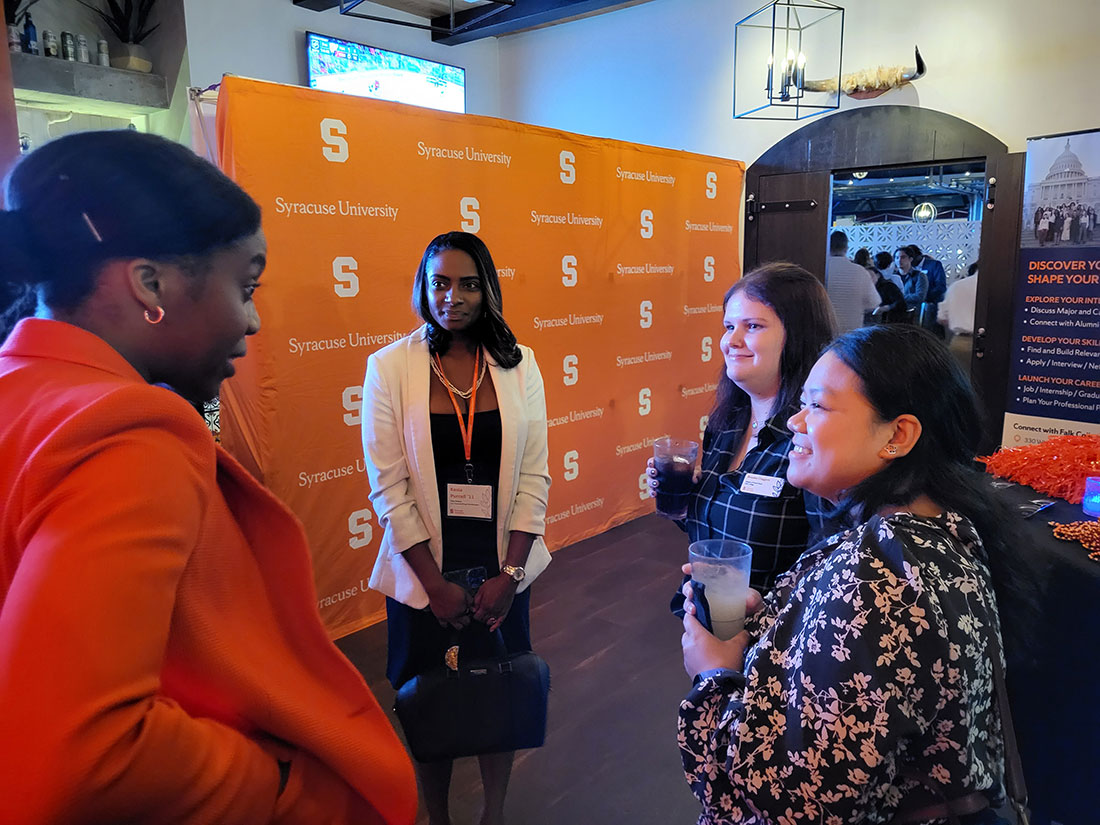
What is your most memorable takeaway from the Falk in D.C. trip?
Liam Roberts: I engaged with and explored exciting opportunities within the sports industry that I would have otherwise never been able to experience, and in a manner that was fun and interesting. This experience was one that I could not see myself getting anywhere else and I’m glad I had the opportunity to join.
Alexia Harris: This trip provided me with exposure to a lot of different employment opportunities and fields that I had never thought about before, as well as connecting me to a wide variety of people.
Tommy DaSilva: This trip gave me insight into potential careers that I would have never thought possible without these face-to-face conversations.
Brianna Nechifor: I was able to interact with a variety of perspectives in the sports industry, even those you may not think you have a connection with them. Everything is in one way connected, and this trip can help shift your opinions on different sectors of the industry. It’s honestly something you shouldn’t be afraid to apply for!
Nicole Corrente: This was an amazing experience! This trip provided me with once-in-a-lifetime opportunities to meet representatives from the CDC, HHS, ACFS, and several nonprofit agencies. Learning about these organizations taught me a lot about the importance of a strong work ethic and an open mind. I look forward to staying connected to the Syracuse University alumni that I met and staying engaged with the work they’re doing in D.C.
Students interested in the “Falk in D.C.” trip in the Fall 2024 semester can watch a video summary of the trip and find Fall 2024 updates on the Falk Careers home page.
New Dean for Research
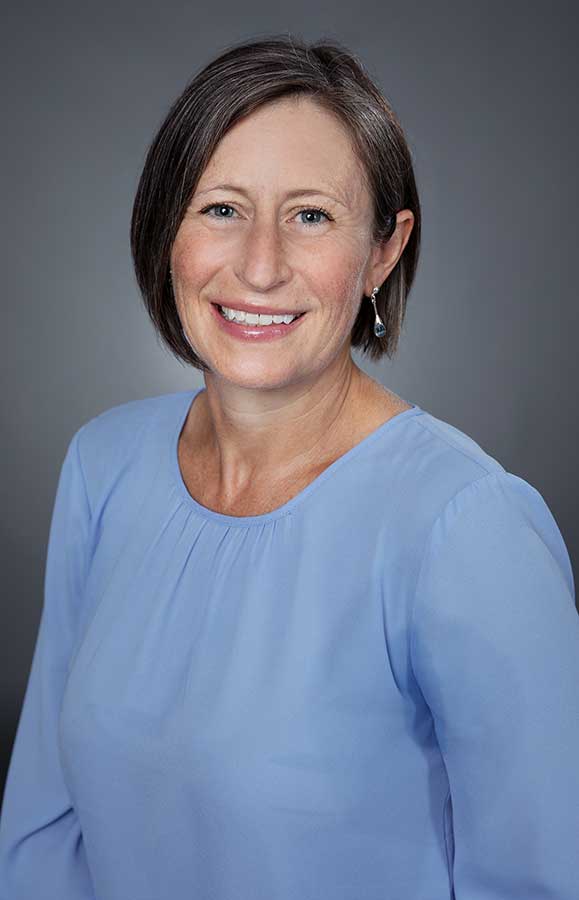
Katherine (Katie) McDonald, Ph.D., has been appointed Senior Associate Dean for Research and Administration in Falk College. As Senior Associate Dean, McDonald is responsible for the oversight of research, administration, and support for faculty; the supervision of the Falk College Office of Research Development; the development and implementation of Falk strategic initiatives; and representing Falk College on University-level committees as appropriate. The office reports directly to Falk College Dean Jeremy Jordan.
“Falk College research spans a wide range of disciplines with impactful, practical applications in individual health and community wellbeing,” Jordan says. “Thanks to Dr. McDonald’s leadership and her team in the Falk College Office of Research Development, the College has experienced steady growth in research activity by every measure, including grant funding, publishing, interdisciplinary collaborations, and student engagement. I am eager to see her influence expand as Senior Associate Dean for Research and Administration.”
McDonald’s new appointment follows a three-year appointment as Associate Dean of Research. During her tenure, McDonald worked collaboratively to establish programming to nurture faculty research, enhance connections on campus to fuel interdisciplinary research, and develop policy to foster research success.
“I am delighted to continue to serve Falk College in this new role,” says McDonald. “Falk College is home to students, staff, and faculty committed to creating and leveraging scientific discoveries to enhance human thriving. It is an honor to have the opportunity to work with so many talented people to co-chart our future.”
McDonald is a professor in the Falk College Department of Public Health, where she also served as chair from 2018 to 2020. She is a fellow of the American Association on Intellectual and Developmental Disabilities, chair of Syracuse University’s Institutional Review Board, and a member of the Editorial Board for Autism in Adulthood. At Syracuse University, she holds faculty affiliations in the Aging Studies Institute, the Burton Blatt Institute, the Consortium for Culture and Medicine, and the Disability Studies program.
As a scholar, McDonald uses socioecological theory and community-engaged research to understand and promote the inclusion of individuals with disabilities. She has made significant contributions to research in disability, health disparities, community-engaged research, and ethical, legal, and social issues in research. Her research has been supported by grant funding from the National Institutes of Health, U.S. Department of Education, the National Institute on Disability, Independent Living, Rehabilitation Research, and the Patient Centered Outcomes Institute, among others. She is published in leading journals such as the Disability and Health Journal, American Journal of Bioethics, and the American Journal on Intellectual and Developmental Disabilities.
She received a B.S. with distinction in human development and family studies with a minor in French from Cornell University and a Ph.D. in community and prevention research psychology with a minor in statistics, methods, and measurements from the University of Illinois at Chicago.
‘Same Playing Field’
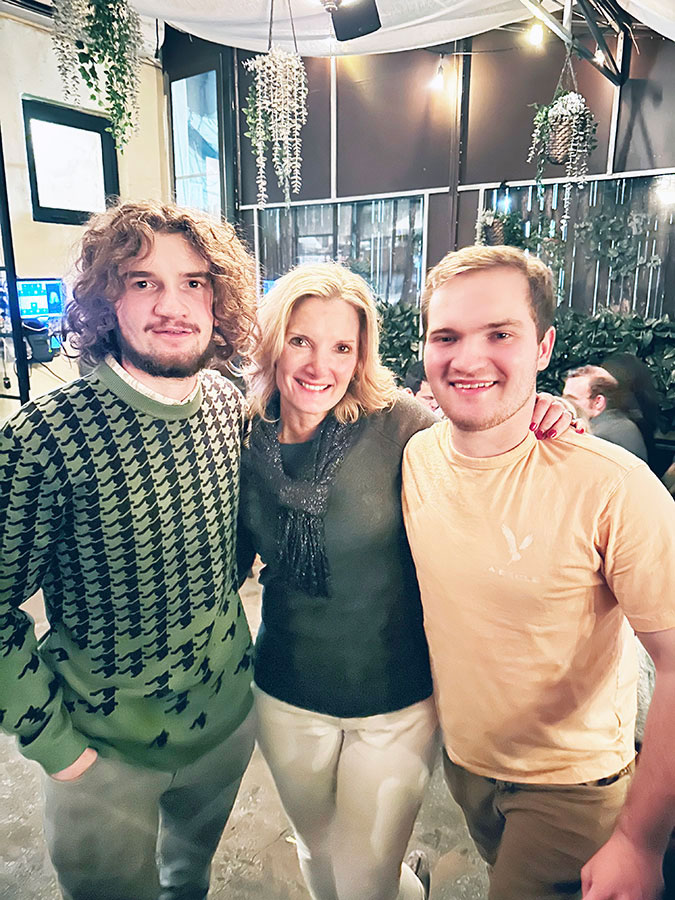
After David Sobczak ’23 enrolled at Syracuse University, he gravitated toward social work and helping others because of the time he had spent in hospitals as a child with cerebral palsy.
“He was in and out of the hospital for extended periods of time, and what he saw were a lot of kids who were in the hospital and literally no one ever came to see them,” says Dee Anna Sobczak, David’s mother. “With his family and friends, David was never alone, and we would embrace kids that were there and bring them into our circle. He realized then and there that he’s very lucky to have a support group and not everybody has that.”
Sobczak wanted to be a football coach, and he earned his undergraduate degree from the School of Social Work in the Falk College of Sport and Human Dynamics because a football team, like society, is made up of people from all walks of life. He wanted to learn how to best communicate with the players, show empathy for their individual situations, and build trust–the building blocks of social work.
Sobczak spent four seasons as offensive student assistant coach for the Syracuse football team, and he recently completed his first season as an offensive assistant coach for the University of Akron. Meanwhile, Sobczak’s younger brother, Danny, played football in high school and he and David told their mother that in both high school and college, many of the student-athletes struggled to pay for day-to-day items.
“What we found is that a lot of the students who were part of the team were on scholarship, but they weren’t funded for school supplies, their computer–all the things that would have set them up to be just as successful as their peers,’’ Dee Anna Sobczak says. “Many of the kids didn’t even have the money to buy lunch.”
As a result of those conversations, Dee Anna, David, and Danny, who graduated from the University of Colorado Boulder last spring, decided to create a fund to help Falk College students who are experiencing financial hardship. Working with Director of Development Megan Myers, who will become Falk’s assistant dean of advancement March 1, they created the Sobczak Family Student Support Endowed Fund that provides mini grants for an academic year.
“A lot of times, these students are trying to fight their way out of whatever situation they came from and start a new life for themselves,” Dee Anna Sobczak says. “This (fund) is to help set them up to be as successful as their peers, and that way everybody is on the same playing field as much as they can be.”
The mini grants are available to meet a wide range of needs and provide access to opportunities. Categories of support include emergency basic needs, fees, and supplies associated with the student’s educational program, and other critical student and human needs. Mini grants range from $100 to $300.
The Sobczak Family Fund is open to graduate and undergraduate students from the following Falk College programs: Exercise Science, Human Development and Family Science, Marriage and Family Therapy, Nutrition and Food Studies, Public Health, and Social Work. In the types of needs it addresses, the fund mirrors the Brandon S. Steiner Sport Management Student Support Fund for students enrolled in Falk’s Department of Sport Management.
Students may apply for assistance from the Sobczak Family Student Support Fund by filling out this application form and including documentation/information about circumstance. A student can’t be awarded funding more than twice.
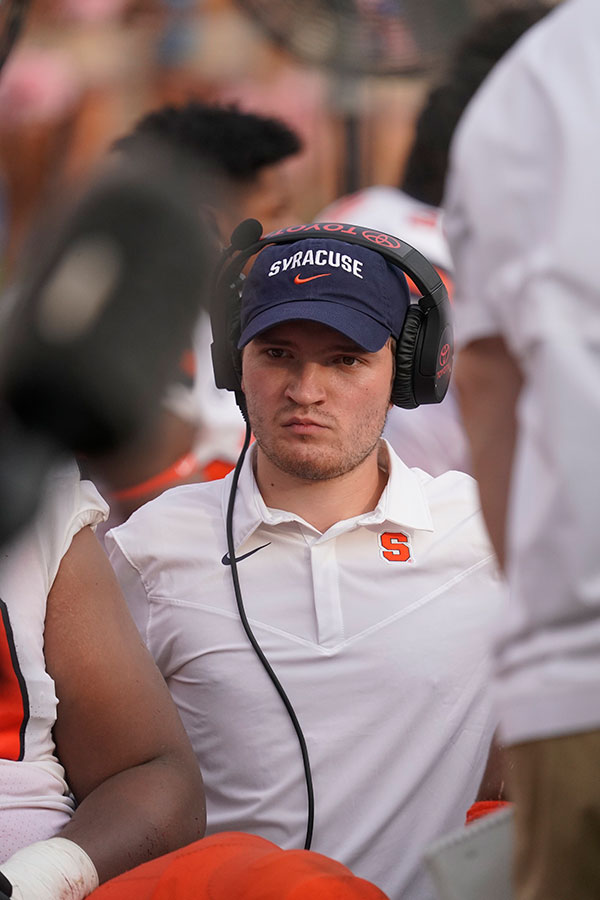
David Sobczak’s disability is physical, and his challenges are there for all to see. But what his Social Work education taught him and his family is that we don’t know everything that might be going on in a person’s life, and the family fund is for students whose challenges may not be so obvious.
“There are really special people in Social Work,” David Sobczak said in a fall 2022 interview. “When it comes to my career and where it helps me, I’m going to encounter–and I’ve already encountered–people with tough situations in their family lives and you’ve got to be there for them.
“So, you learn about empathy, how to deal with people, and how to communicate, and you also learn that we’re all people,” he added. “You treat people as people and that’s a life skill that will take you further than any education can ever take you.”
In that interview for a feature story that appeared before Syracuse’s bowl game in 2022, David talked about wanting to give back and serve as a role model for those with disabilities who have dreams of their own. The family fund for Falk Students, Dee Anna Sobczak says, is to help students overcome outside challenges to complete their education and realize their dreams.
“We want them to be the best version of themselves they can be, figure out who they want to be and what they want to do, and put a path together to get there,” Dee Anna says. “And also, to realize that nothing is impossible; if you can dream it, you can do it.”
In addition to the Sobczak Family Student Support Endowed Fund, there are other opportunities and awards available to students in Falk College. Please visit the Awards and Scholarships page on the Falk website for more information on how to apply.
About Forever Orange: The Campaign for Syracuse University
Orange isn’t just our color. It’s our promise to leave the world better than we found it. Forever Orange: The Campaign for Syracuse University is poised to do just that. Fueled by more than 150 years of fearless firsts, together we can enhance academic excellence, transform the student experience, and expand unique opportunities for learning and growth. Forever Orange endeavors to raise $1.5 billion in philanthropic support, inspire 125,000 individual donors to participate in the campaign, and actively engage one in five alumni in the life of the University. Now is the time to show the world what Orange can do. Visit foreverorange.syr.edu to learn more.
Supporting Student Experience
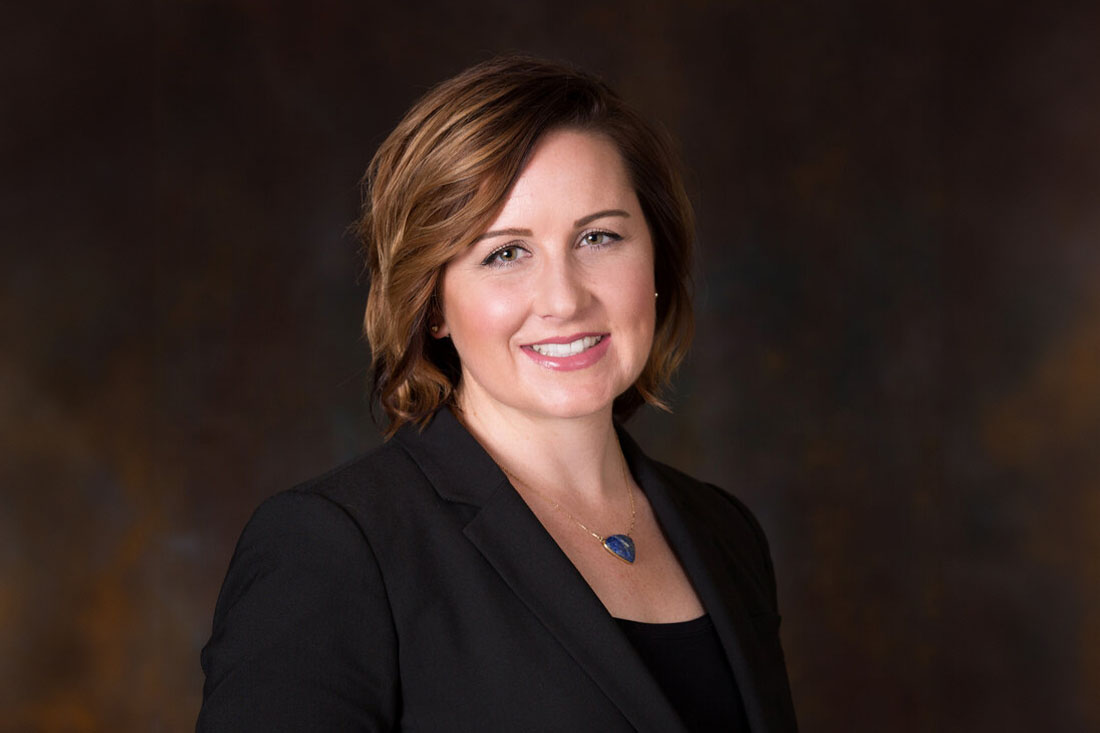
Megan Myers has been named Falk College Assistant Dean of Advancement effective March 1, 2024. Myers will report to Dean Jeremy Jordan and lead all Falk College advancement efforts working closely with the Syracuse University Office of Advancement and External Affairs (AEA).
Myers joined Falk College’s advancement team as assistant director of development in December 2018 and was promoted to director of development in December 2021. In these roles, Myers successfully managed an assigned donor portfolio, established and managed relationships with Falk College alumni and donors, and collaborated with Syracuse University’s regional fundraising program.
“Megan has an exceptional history of success in creating new strategic partnerships and developing alumni engagement with Falk College,” says Falk College Dean Jeremy Jordan. “From new signature programs to targeted student support funds, Megan’s contributions have meaningfully advanced this College. I am confident that under her leadership we will continue to enrich the student experience.”
Prior to joining Falk, Myers was a development associate in AEA and highly successful as part of the inaugural Development Associate Team established as part of the planning for prospective donor development in the Forever Orange Campaign.
“I am thrilled to have the privilege to support Dean Jordan and advance his vision for the future for Falk College,” says Myers. “I look forward to continuing to build upon the excellent work my predecessor Dave Salanger has already initiated for the College by further developing relationships with alumni, parents, and friends of Syracuse University that create new opportunities for students and faculty.”
Myers previously worked as a development specialist with the Alzheimer’s Association, Nebraska Chapter, where she managed community-based, volunteer-driven events. In her professional career, she held positions with KLKN-TV in Lincoln, Nebraska, serving as a promotions manager and earning recognition as an Emmy-nominated reporter/anchor. She also contributed as an anchor for the weekend news at KEVN-TV in Rapid City, South Dakota, where she played a key role in achieving notable viewer market ratings.
She recently earned a master of public health from Syracuse University and holds a bachelor of arts in broadcast journalism and sociology from The Pennsylvania State University, where she was an Academic All-American and team co-captain for the women’s swimming and diving team.
Myers succeeds David Salanger, who will retire in March 2024. Salanger served 20 years at Syracuse, 18 of those with Falk College. During that time, he made a transformative impact on Falk College through alumni engagement, strategic partnerships, and critical financial gifts.
Among his contributions, Salanger was instrumental in guiding the generous gift from David B. Falk ’72 and Rhonda S. Falk ’74 that named the College in 2011. In addition, he secured the financial support for the renovation of Falk College Complex, previously the College of Law, in 2015. In the course of his service, Salanger raised over $40 million for the University and Falk College.
Remembering Together
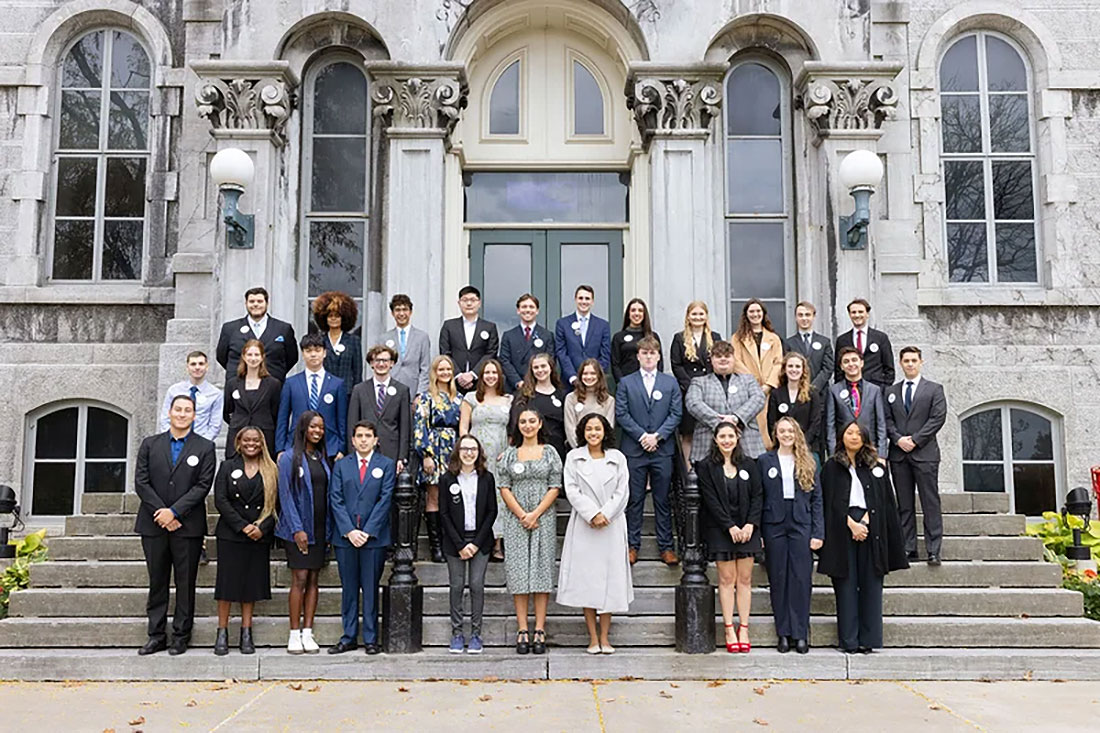
Sophie Creager-Roberts ’24 wasn’t born when the Pan Am Flight 103 bombing occurred on Dec. 21, 1988, but that hasn’t stopped her from learning about it. If anything, she has developed a unique perspective of the tragedy, in which 270 passengers, including 35 Syracuse University students, died over Lockerbie, Scotland.
Sophie Creager-Roberts ’24 wasn’t born when the Pan Am Flight 103 bombing occurred on Dec. 21, 1988, but that hasn’t stopped her from learning about it. If anything, she has developed a unique perspective of the tragedy, in which 270 passengers, including 35 Syracuse University students, died over Lockerbie, Scotland.
“My time at Syracuse has been shaped by my desire to understand how the present is indelibly linked to our reckoning with the past and all its complexities,” says the dual major in history and environment, sustainability and policy. “This eagerness is what inspired me to declare my academic majors and study abroad in Poland.”
It also motivated her to apply to become a 2023-24 Remembrance Scholar—a cohort of students charged with educating the campus community about the bombing, which is the United States’ second deadliest terrorist attack after 9/11.
We recently caught up with Creager-Roberts (SCR) and four other Remembrance Scholars to discuss the bombing’s 35th anniversary—Benjamin Johnson ’24 (BJ), an Air Force ROTC cadet majoring in computer engineering; Guerdyna Gelin ’24 (GG), a policy studies major; Lucio Maffei ’24 (LM), a dual major in ethics and political philosophy; and Emily Shuman ’24 (ES), a human development and family science major.
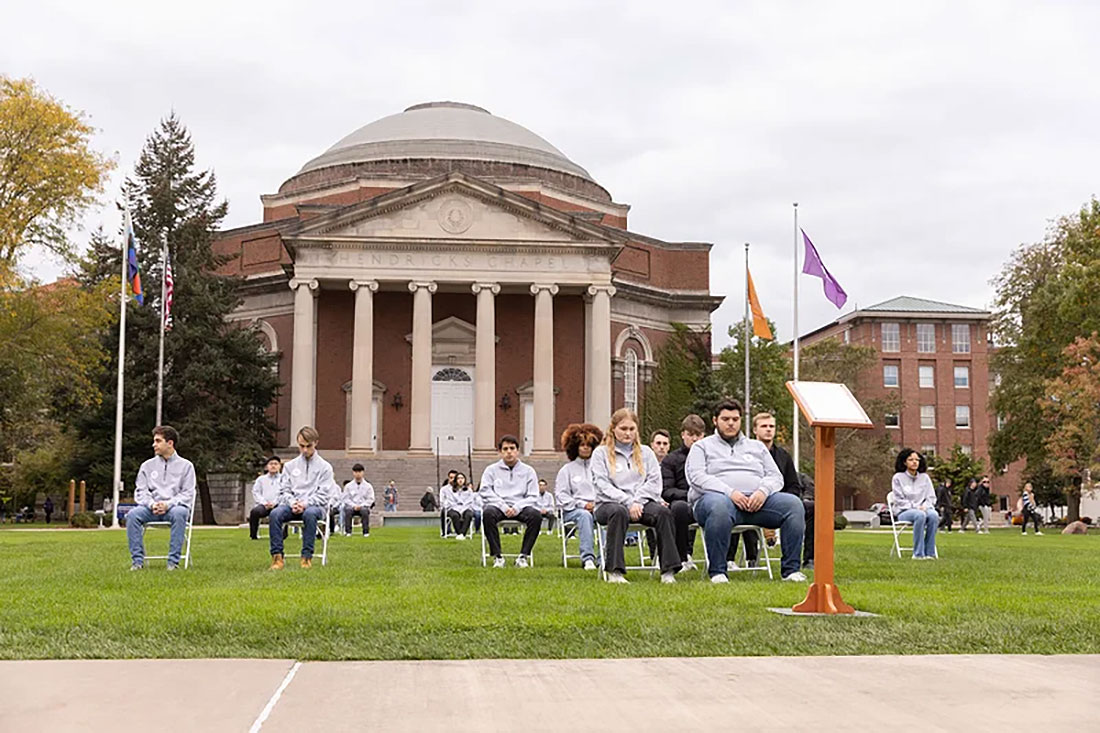
Why should we remember the events like the Pam Am Flight 103 bombing?
BJ: Doing so fosters unity and resilience. When we come together, we can help heal the emotional wounds surrounding such a tragedy. It reminds us that every life is precious, that we should work to protect the lives of others.
LM: We must learn from the past to act on the future. Having met the families and friends of many of the victims, I know that Remembrance Week and the Pan Am Flight 103 Memorial Service [which occur every October and December, respectively] mean a lot to them. These events help keep the victims’ memories alive.
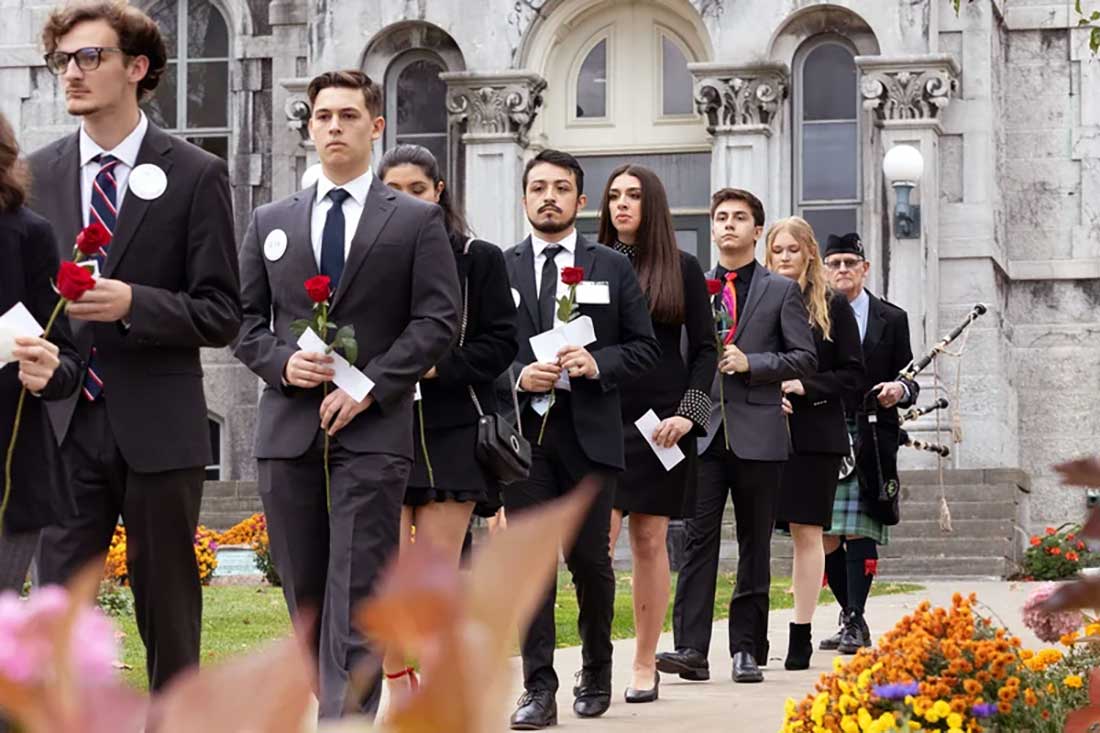
How do you educate others about it?
ES: I’ve gone to several classes and given presentations about the bombing—its history, the resources available in the Pan Am Flight 103/Lockerbie Air Disaster Archives and the different ways that students can pay tribute to the victims. Three other scholars and I have also talked at a chapter meeting of the Phi Delta Epsilon medical fraternity.
SCR: We’ve provided additional opportunities for healing and education through screenings of the documentary Seat 20D [which explores how a mother turned to art to cope with the loss of her son from the bombing] and artistic initiatives, like Remembrance Stone Painting on the Quad.
GG: I’ve been on several University social media channels, discussing the profound significance of Remembrance Week and the tragedy that it commemorates. Educating and engaging with the campus community in this way speaks to the powerful, far-reaching impact that social media wields among our generation. It’s heartwarming to see our message resonate with so many students.
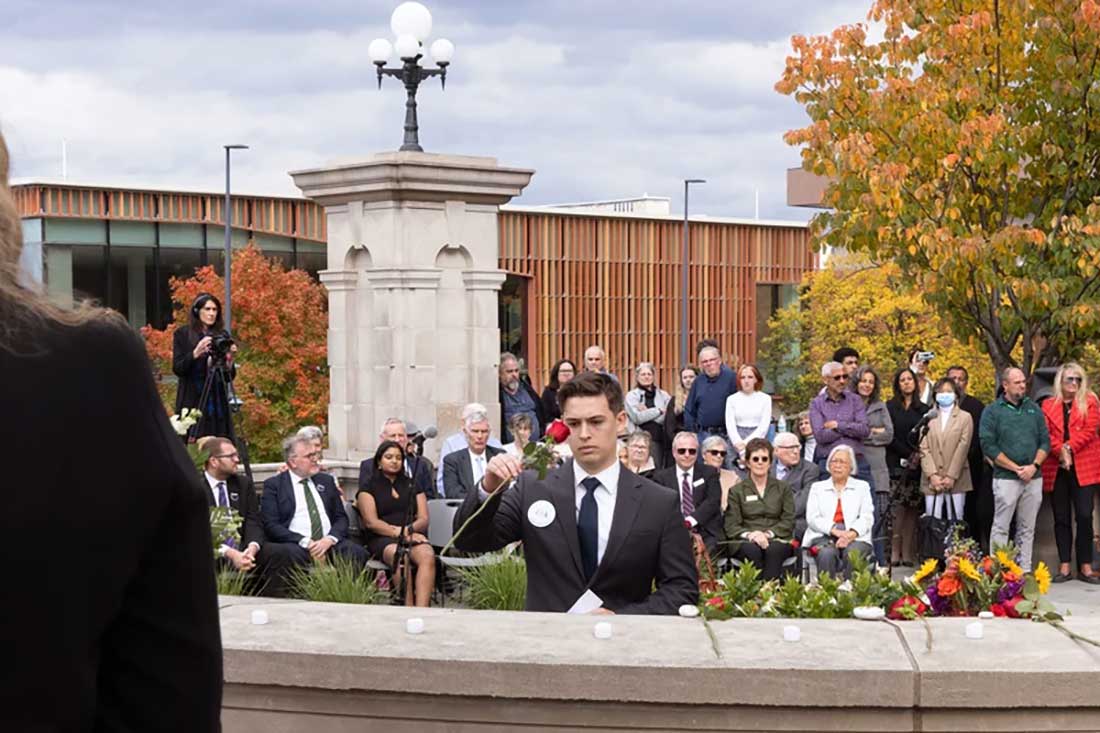
What have you gained from being a Remembrance Scholar?
LM: It’s been an emotional experience, whether I’m meeting with someone from the victim’s family or sitting in solidarity in the “Empty Seats Display” on the Quad. It’s difficult, but also enlightening. I have a greater awareness of the tragedy and a renewed respect for the victims’ loved ones and family members who continue to face overwhelming loss and grief.
ES: I’ve learned a lot about healing and empowerment. Just being in the Pan Am Flight 103 archives has shown me how to honor the memory of someone I’ve never met. It’s like gaining and losing a friend at the same time. Any one of us could have been on that plane. We must ensure that the victims aren’t forgotten.
GG: Interacting with members of our campus community about the tragedy has improved my leadership and communications skills. It’s also given me a stronger sense of purpose. Being a Remembrance Scholar is a transformative journey. I’ve experienced personal growth while promoting peace and preserving legacy, even in times of grief.
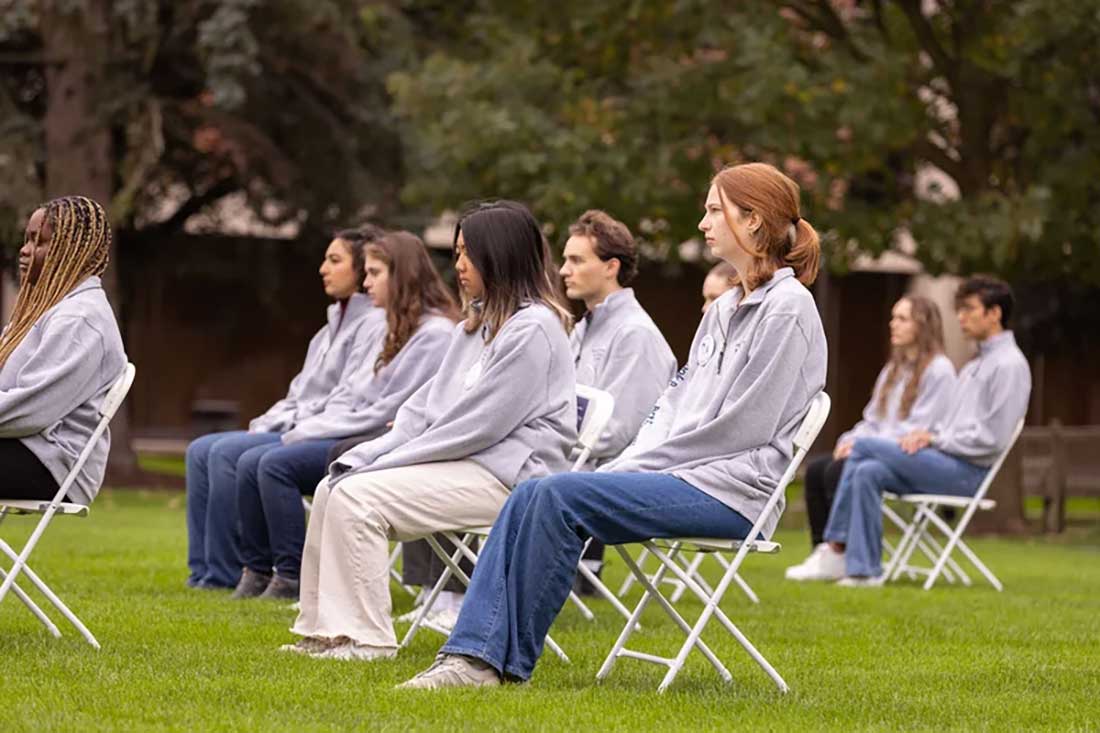
Why did you apply for the scholarship?
SCR: Carrying the victims’ memories forward is only part of reconciling with the past. It’s also an opportunity to fulfill the promise of remembrance by Chancellor Melvin A. Eggers [who, on the heels of the tragedy, established the Remembrance Scholarship program]. He said that the families’ “sons and daughters will be remembered at Syracuse University as long as any of us shall live and so long as the University shall stand.”
BJ: I applied so that I could surround myself with people who have the same passion and motivation as I for serving their community. In a few months, I’ll graduate from Syracuse as a second lieutenant and make an impact somewhere else in the world. I hope that as a Remembrance Scholar, I’ve been able to demonstrate how education and service can help strengthen the community and give people a sense of purpose.
An SU Story by Rob Enslin originally published on Dec. 12, 2023.
Video: ‘A Bigger Reason’
As a Human Development and Family Science major, Calen Headley spent last spring as an intern at InterFaith Works of Central New York, where he worked with refugees who arrived through the federal refugee resettlement program. “Overall, you just know there’s a bigger reason to everything being done here, which is to provide help to all of the refugees in Syracuse,” says Headley, who earned his undergraduate degree in May.
While continuing his work at InterFaith Works as Health and Integration Administrative Assistant, Headley is also pursuing his master of social work (M.S.W.) degree at Falk College. He hopes to use his internship and work experience at InterFaith as a springboard to one day returning to his high school in Brooklyn, New York, to help students as a mental health counselor.
Video: ‘Right for This Path’
Before graduating in May 2023, Human Development and Family Science major Julia Lee spent the spring semester working as an intern at the Korean Church of Syracuse near the Syracuse University campus. “When I met Julia, she was already so passionate to meet the refugee kids and ready to interact with them. It was very impressive,” says Yunhee Kim G’09, an office administrator at the Korean Church of Syracuse.
In September, Lee started her professional career as a teacher assistant at Twin Parks Montessori Schools in New York City that offer programs for children from three months to six years of age. “Because of this internship class, I feel like I got to build more experiences and find if I’m right for this path,” Lee says.
Joining the Leadership Team
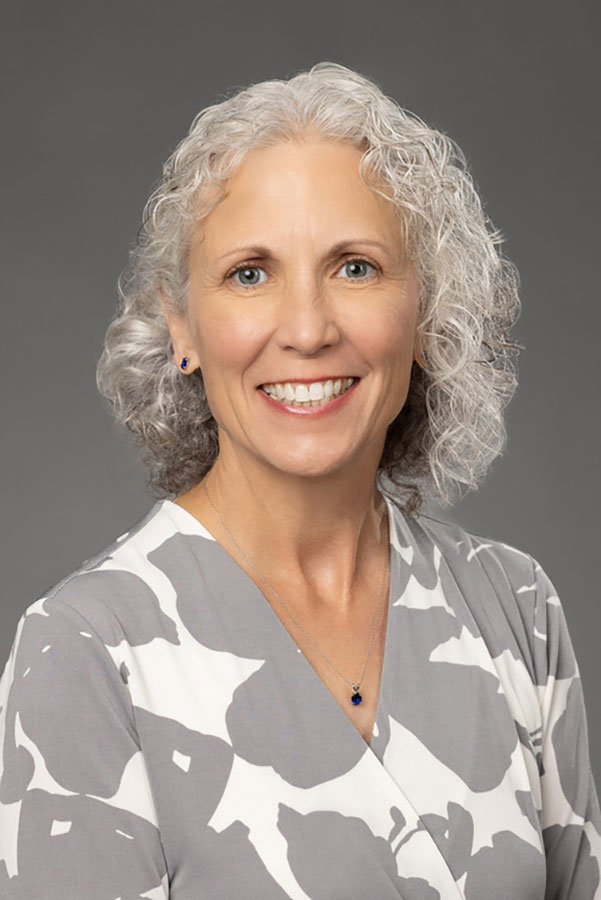
Mary E. Graham, Ph.D., professor in the Department of Sport Management, has been named Falk College Associate Dean of Faculty Affairs effective Jan. 2, 2024. This newly created leadership position reports to Falk College Dean Jeremy Jordan and is dedicated to faculty development and success. In this role, Graham will guide all Falk College efforts related to faculty development—from hiring to retirement—and work closely with university offices and leadership in Academic Affairs, University Counsel, Equal Opportunity Compliance, Human Resources, and Office of Research.
“I am excited to appoint Dr. Graham to this new role for Falk College,” says Jeremy S. Jordan, Dean of Falk College. “I am very confident that she will be able to further the support and development of our faculty based on her wealth of professional experiences and academic expertise.”
As Falk College Associate Dean of Faculty Affairs, Graham will work with department chairs to develop strategic hiring plans for faculty and oversee the successful execution of faculty searches. She will participate in faculty review processes, including recommendations for contract renewals and promotion and tenure, and manage operational aspects of faculty affairs. Together with Falk College leadership, Graham will steer the college towards enhanced faculty research and teaching excellence.
“Falk College has an exceptionally talented, diverse faculty with unparalleled dedication to the student experience and the creation of new knowledge,” says Graham. “I am honored to serve as Associate Dean of Faculty Affairs in service to my faculty colleagues and the linked missions of Falk College and Syracuse University. I look forward to collaborating with our visionary Dean, Jeremy Jordan, and his leadership team on strategic and operational faculty matters.”
Graham joined the Falk College faculty in 2012 and is also affiliated faculty in the Whitman School of Management. She teaches applied courses in organizational behavior and strategic human resource management, as well as diversity in sport organizations at the undergraduate, graduate, and executive levels. An expert in gender disparities in employment, she has conducted numerous American Association of University Women salary negotiations workshops for students since 2009.
In 2022, Graham was named Syracuse University’s faculty athletics representative (FAR) to the NCAA and the Atlantic Coast Conference (ACC). In this capacity she serves as a key advisor to Chancellor Kent Syverud and Provost Gretchen Ritter on policy proposals and issues affecting student-athletes’ academic and overall wellbeing, working closely with Tommy Powell, Assistant Provost for Student-Athlete Academic Development; Athletic Director John Wildhack; and their teams of professionals. Graham chairs the Faculty Oversight Committee on Athletics, which reviews student-athlete academic data and conducts exit interviews of departing student-athletes.
She previously served as a Syracuse University Provost Faculty Fellow from 2018 to 2020, where she worked with the Provost and University Senate to develop and implement campus-wide shared competencies for undergraduate students. Graham has been a University Senator since 2018, and she currently serves on the Senate Committee on Athletic Policy.
Prior to joining Syracuse University, Graham held faculty positions in business schools at Clarkson University, George Washington University, and Georgia State University. She has served as a visiting scholar at National Taiwan University of Science and Technology, National Central University in Taiwan, and at the Federal Reserve Bank of Atlanta. She also has prior work experience with several members of the U.S. House of Representatives. Graham has published extensively and has been widely cited in the areas of human resource management (HRM), public policy and employment discrimination, gender in employment and HRM in supply chains. She is currently studying the equal employment opportunity transparency among professional sport teams, and the impact of concussions on player misconduct.
Graham is on the Editorial Board of the journal Human Resource Management (Wiley), where she previously served as an associate editor. Her professional memberships include the Society for Human Resource Management; and the Academy of Management, where she serves on the executive committee of the Research Methods Division.
A former CPA, Graham has a B.S. in Accounting from Le Moyne College and work experience in public accounting and human resource management. Graham earned both her M.S. and Ph.D. degrees in Industrial and Labor Relations from Cornell University, specializing in human resource management, organizational behavior, and gender studies.
From the Finish Line to the Classroom
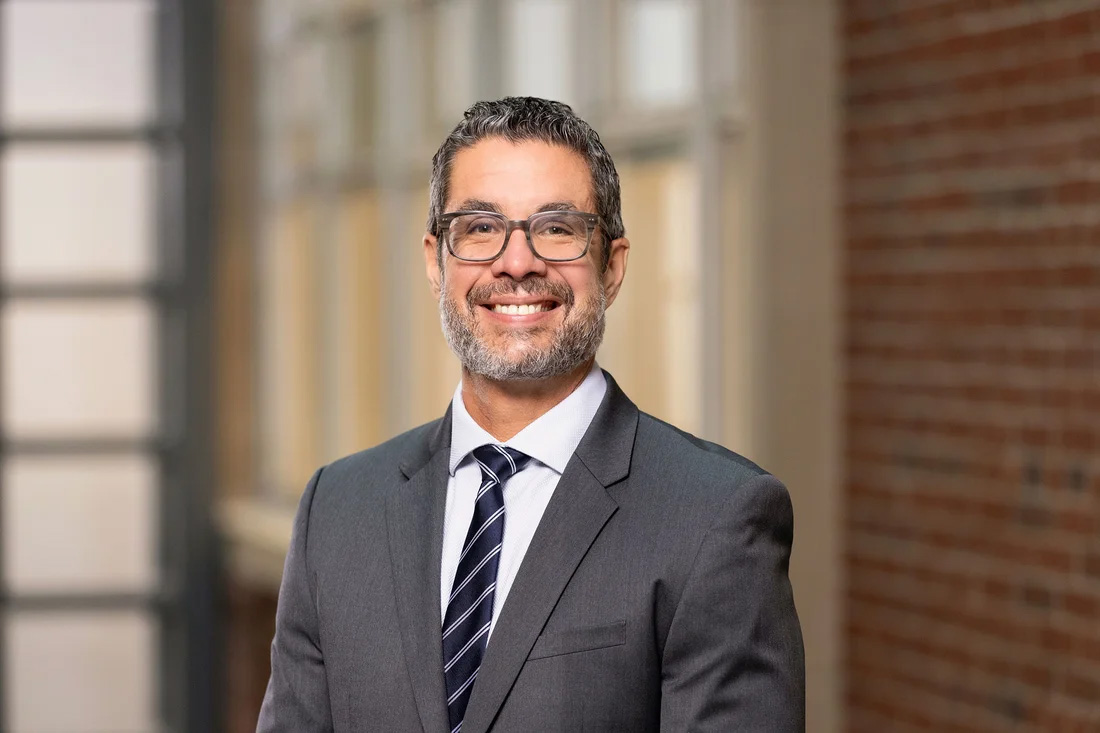
What five words best describe you?
Well, this is what I would hope for: Kind, empathetic, fun(ish), focused, humble.
Three fun facts about yourself that others may not know?
I have run 12 marathons and 25 half-marathons. I love live music and try to go to as many concerts as a I can. One of my favorite places to visit is Japan—I love the people and the culture.
Do you play a sport or follow a sports team?
During COVID I bought a Peloton bike, so now I spend a lot of time riding a bike that goes nowhere. After living in Philadelphia for 15 years, I tend to root for the Phillies and Eagles.
Favorite band?
Pearl Jam, I am old.
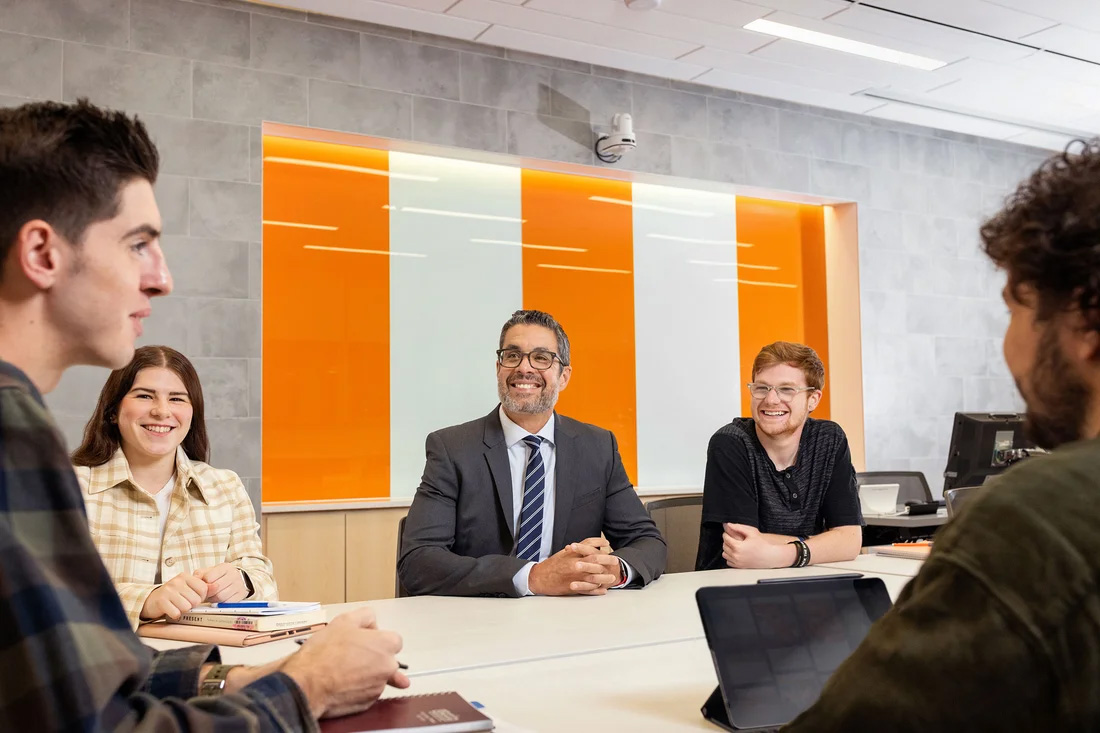
Favorite podcast, book, movie or hobby you’ve enjoyed recently?
I have been reading Lincoln in the Bardo by George Saunders. It is a unique book that I have enjoyed quite a bit. Fun that he is a faculty member at Syracuse.
Most interesting travel experience you’ve had?
I love to travel abroad and experience all that is available at the destination, especially the food. The most epic travel day I have had was in Tokyo. The day started with a bike tour through the city where we stumbled upon one of the best Oktoberfest celebrations I have seen (it was in May by the way). The day ended with some amazing street food and a visit to the robot bar. I got to share this day with my spouse, Laurel, and a good friend, which made it even more special.
Best advice you’ve received?
Listen more, talk less.
What most appeals to you about living in Central New York?
I have really enjoyed learning about all the different outdoor activities and festivals.
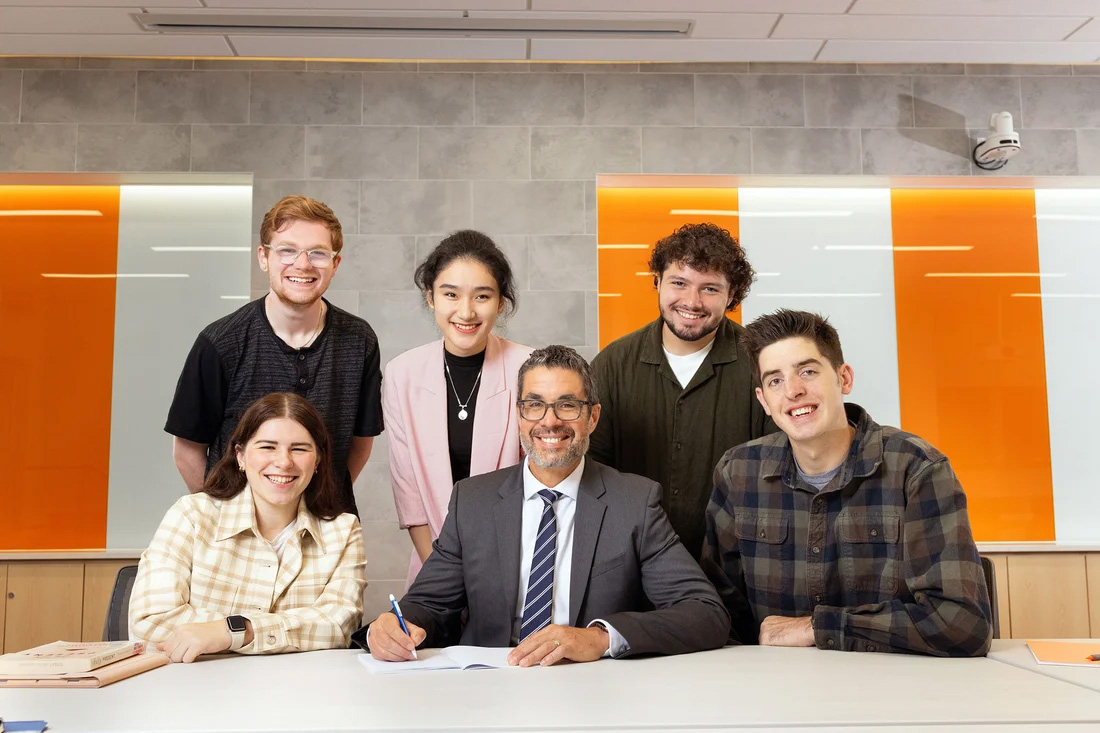
How do you bring out the best in your students?
Understanding their academic and career aspirations and making sure we provide the necessary support and resources for them to be successful. We work collaboratively with our students to help them achieve their goals.
What do you look most forward to in your role as dean?
Working with the faculty and staff to provide a transformational experience for our students. We will tell the story of Falk, in part, through the outcomes of our students.
An SU Story by Maren Powell originally published on November 3, 2023.
Impact of ‘Social Factors’
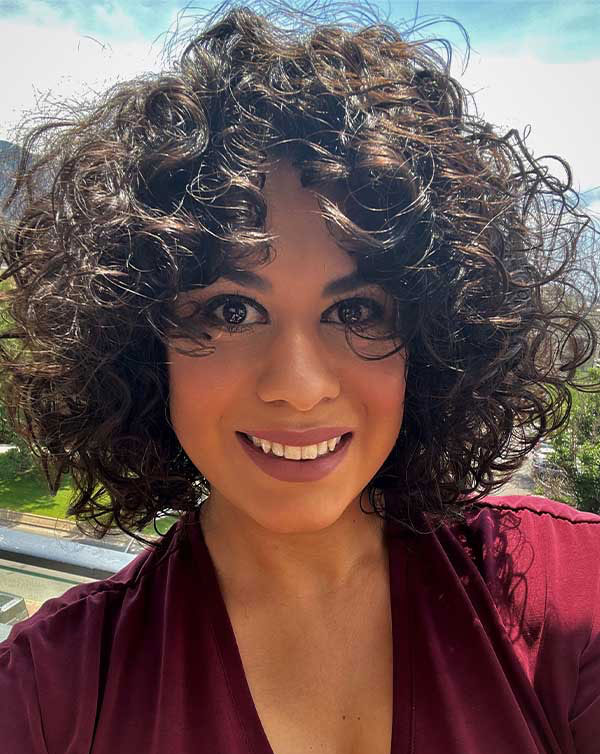
Catherine García wants to know how and why the fastest-growing segment of older adults in the United States—those of Hispanic/Latine origin—are at higher risk for chronic diseases, such as Type 2 diabetes, kidney disease and Alzheimer’s disease and related dementias. She’s particularly interested in discerning how social factors “get under the skin” in those populations to influence biological functions and overall health.
García is an assistant professor of human development and family science in the Falk College of Sport and Human Dynamics. She’s also a faculty affiliate at the University’s Aging Studies Institute, Center for Aging and Policy Studies and Lerner Center for Public Health Promotion and Population Health. García came to Syracuse in 2021 from the University of Nebraska-Lincoln, where she was an assistant professor of sociology and a core faculty member of the Minority Health Disparities Initiative. Her award-winning research has been supported by the National Institute on Aging and the National Institutes of Health.
You’re a gerontologist with training in sociology. What attracted you to the Falk College, and how does a social lens influence your research on health outcomes and biological functions?
I jokingly call myself the “resident gerontologist” at Falk, since I have the training and specialize in the older adult population. What attracted me to the college was the interdisciplinary focus of scholarship and service to the local community, including the many partnerships that Falk espouses. As part of the Falk community, I have been invited to join the Syracuse University/SUNY-Upstate Medical Center Aging Collaborative and Upstate’s Community Research Recruitment Accelerator, which reviews and recommends changes to studies to increase recruitment and retention rates of underserved communities.
One of my current projects, “Pathways to Cognitive Function among Older Hispanics/Latines,” emphasizes my sociological training in social stratification and how those factors translate into health risks generally within the Latine population in the United States and in Puerto Rico. I am assessing the effects that education, physiological factors and cognitive function have among a diverse sample of older Hispanics/Latines. I’m also studying how social factors have predictable and enduring biological impact and the significant consequences those social factors have for cognitive health across the life course.
What are your research goals?
I hope to better understand the pathways that social and material disadvantage present in an individual’s health and how societal disadvantages can become biologically embedded.
Social adversity and life course experience—and how that gets translated and incorporated in a person’s body at the cellular level—can translate to chronic conditions. In the Latine population, a lot of people don’t have access to health insurance (thus access to routine medical care). So, a diagnosis can come at later stage when the disease is more severe. There’s a difference there compared to someone who’s had more socioeconomic advantage in accessing regular health care and thus in their potential for healthy aging.
What are you discovering?
Social Conditions Related to Latino Ethnic Origin and Immigration History
In a forthcoming book chapter, my colleagues and I use data from the American Community Survey, an ongoing, nationally-representative household survey conducted by the U.S. Census Bureau throughout the United States and Puerto Rico. We found that when solely considering Latine heritage, Puerto Ricans had the highest probabilities of self-reported cognitive impairment at all ages, followed by Dominicans, Cubans and Mexicans. (Cognitive impairment is a precursor to cognitive decline and dementia and one of the earliest noticeable symptoms of Alzheimer’s disease and related dementias.) When birthplace or nativity status is combined with Latine heritage, some Latine heritage groups displayed an immigrant advantage that further widened with age. (The phrase “immigrant advantage” refers to the fact that, upon arrival to the United States, most foreign-born Latines have relatively good health as they have not yet suffered the full biopsychosocial consequences of othering/marginalization, known as the Hispanic epidemiological paradox.) Additional consideration of age at migration revealed that the immigrant advantage does not extend to Latine immigrants who arrived in the United States at age 50 or older, particularly for Cuban, Dominican and Puerto Rican women. Lastly, we find that higher educational attainment is associated with lower probabilities of self-reported cognitive impairment for many Latine groups.
With data from the Health and Retirement Study (a nationally representative survey of adults over age 50 in the U.S. that has been conducted biennially since 1992), preliminary findings show that social positioning and adversity do have different influences on physiological functioning, which may help explain why certain groups of Hispanics/Latines may be more likely to experience chronic disease in middle and older adulthood.
Socially disadvantaged groups are more likely to have lower levels of education, are more likely to live in areas where they are disproportionately exposed to harm through factors such as air pollution and poor housing quality, and they tend to exhibit adverse health behaviors, such as poor nutrition, compared to their more socially advantaged counterparts. Other studies express that local economic, service, social, natural and policy environments are primary causes of health disparities. Multiple forms of social disadvantage can trigger a cascade of pathophysiological processes that may trigger disease-related processes. There’s also evidence that certain groups of Latines have worse health outcomes relative to other Latine groups, particularly older, island-born Puerto Ricans.
How can we level out health disparities among the diverse populations in the U.S.?
At minimum, we need to create protected, community-supported spaces to create healthy environments for older adults from diverse communities. Given the range of origins of Hispanics/Latines in the U.S. in ethnicity, birthplace and current residence, it is crucial to understand how these factors get “under the skin” to affect biological processes that influence chronic disease in middle and older adulthood. That’s my essential question.
A Syracuse University News Story by Diane Stirling originally published Oct. 6, 2023.
Page 5 of 25
